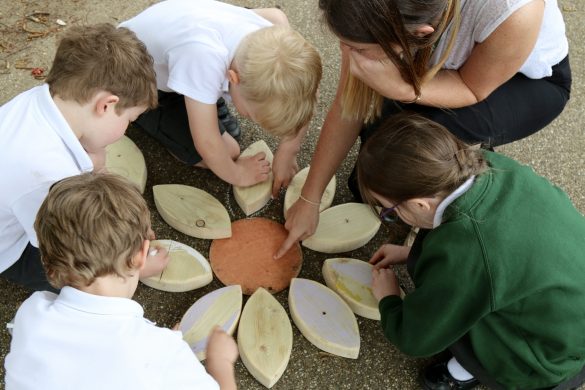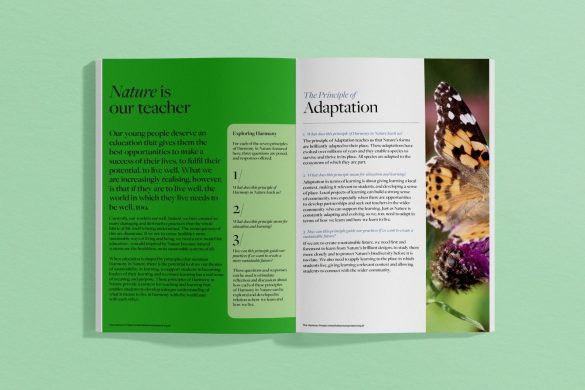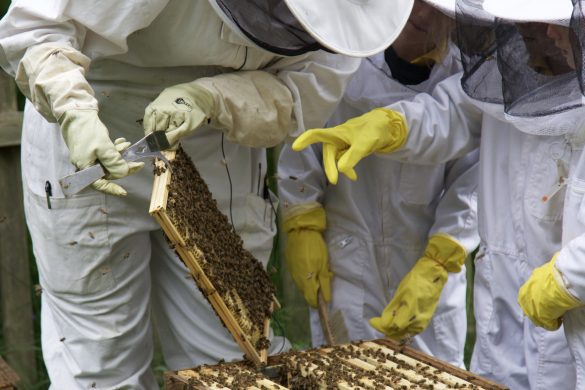How to decide on enquiry questions and order enquiries of learning

Enquiry questions help to frame learning. Here's how to generate them and order enquiries of learning throughout the school year.
One you’ve decided on the enquiries of learning you plan to teach in each year group, it’s a good idea to review them, as a whole school or across a key stage. This helps to ensure progression in how students learn about each principle of Harmony and helps to avoid repetition. As a rule of thumb, six half-termly enquiries of learning per year group is a good number to aim for, as this allows for one enquiry of learning per half term. The next step is to decide on an enquiry question for each enquiry of learning, which acts as a title for the enquiry and is a good way to engage students in the learning.
Why use an enquiry question as the title for an enquiry of learning?
By phrasing the title of each enquiry of learning as an enquiry question, there is an immediate ‘way in’ to explore – and later to reflect on – what has been learned. Students can share what they enjoyed most during the enquiry of learning using the enquiry question as a prompt and evaluate how they think their learning has improved.
With younger students, this evaluation process may be through a class discussion. With older students, they can write their own evaluations. It is always good to discuss the questions posed in the evaluation process first to warm up their thinking.
What makes a good enquiry question for an enquiry of learning?
An enquiry question should be clear and simple to understand. It should give students a real sense of what they will be exploring and finding out about on their journey through the enquiry of learning. The wording of the enquiry question needs careful consideration to ensure it captures the essence of the learning, ignites the interest of the students, and enables them to understand the learning in the wider context of a Harmony principle or principles.
An enquiry question is a way of framing a half-term’s learning so that it engages students in thinking about the ways in which they might answer it or go about finding answers. These questions work best when they are open-ended and phrased in a way that promotes debate and discussion.
How can enquiries of learning be linked to the season or time of year?
With the titles of each enquiry of learning in place, it is time to decide on the order in which the enquiries of learning in each year group will be taught. This helps ensure that each enquiry fits the time of year it is taught.
For example, an enquiry of learning about plants and flowers, insects and pollination should really take place during the summer months, when flowering plants and trees are in full bloom and the learning can come to life. Conversely, learning about the solar system and the stars is better taught during the winter months when it is darker and easier to see the planets and stars in the night sky. Depending on the location and cultural context of the school or education setting, timing an enquiry of learning so that it coincides with a particular event or festival can also help give learning context and relevance.
For the most part, the enquiries of learning run for half a term or a six-week block, but there may be times when an enquiry is revisited, for example, when learning about trees through the seasons.

What is the best way to order enquiries of learning through the school year?
An enquiry-based approach to teaching and learning works best when there is a clear flow to the learning. For example, the following sequence of enquiries of learning would work well in Year 2. For each enquiry, the linked principle of Harmony is shown in brackets.
Year 2 enquiry questions
- What do I need to be healthy? (The principle of Health)
- How did London adapt and change after the Great Fire? (The principle of Adaptation)
- How can we bring traditional tales to life? (The principle of the Cycle)
- What can we learn from a journey around the world? (The principle of Oneness)
- Why are bees so brilliant? (The principle of Interdependence)
- Why did dinosaurs become extinct? (The principle of Diversity)
In this example of the way enquiries of learning could be ordered in Year 2, the school year begins with a focus on health and well-being. This is a good way back into learning, putting health at the heart of the year ahead. The enquiry provides lots of opportunities for activities outside and fits nicely with the season of harvest.
As the days begin to draw in, the learning moves on to the Great Fire of London. Through their research of this dramatic event, students learn how life in London changed and adapted. This idea of adaptation has great relevance to us today as we consider how we must adapt our lifestyles and practices to live more sustainably.
At the start of the New Year and in the depths of winter, it is time to share stories and traditional tales from around the world, re-enacting them as puppet shows with puppets made using recycled materials, including all the wrapping paper and packaging from the festive season. Recounts of historical events turn to play scripts and characterisation and a chance to bring stories to life.
Next come the dinosaurs! With species going extinct at an alarming rate today, this enquiry provides a chance to compare and contrast the factors that contribute to extinction then and now. Prehistoric frogs provide a nice connection here as we look out for frogspawn in ponds and wetlands in February and March.
At the start of the summer term, the world is waking up and bees are becoming active as they seek out nectar and pollinate blossoming flowers. Then, finally, as the cycle of the academic year comes to an end, there is the chance to celebrate the beauty of butterflies. As students study the remarkable transformation from caterpillar to butterfly, they can consider the ways in which they, too, have been transformed by their learning experiences over the course of the school year.
Once you have decided on the enquiries of learning that will be taught throughout the school year, it is time to start planning each of them in more detail.



